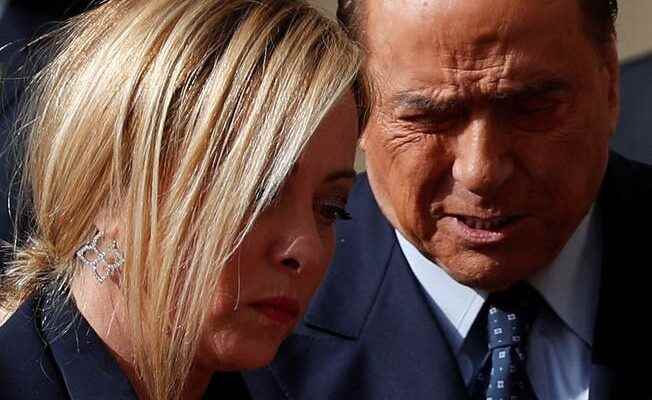After turbulent days, the formation of a government began in Rome on Friday. Above all, Silvio Berlusconi makes life difficult for the election winner.
Giorgia Meloni and Silvio Berlusconi after their meeting with President Sergio Mattarella on October 21st.
The consultations between President Sergio Mattarella and the victorious legal alliance around Giorgia Meloni (Fratelli d’Italia), Matteo Salvini (Lega) and Silvio Berlusconi (Forza Italia) lasted a full seven minutes on Friday morning. In the evening, Mattarella gave Meloni the formal mandate to form a government. She accepted the mandate. Meloni is scheduled to take the oath on Saturday at 10 a.m.
According to everything we know so far, things should go quickly afterwards. Meloni may hand over the list of ministers to the President on the same day. After that, the new government could already be sworn in at the weekend.
First round with Lega boss Salvini
Difficult days had preceded or, as the «Corriere della Sera» aptly called it, a «government crisis before the formation of a government». First, the winner of the election, Meloni, had to put Lega boss Matteo Salvini in his place. He laid claim to the Ministry of the Interior, which he had previously led between 2018 and 2019 in Giuseppe Conte’s first government. In this function, the head of the Lega probably thought, he could have continued his tough migration policy, with which he made headlines and applause in his own ranks at the time.
But Meloni quickly curbed Salvini’s ambitions. According to the latest information from the “totoministri”, Salvini will become the new infrastructure minister and, if he still needs a little tweak, deputy prime minister. The head of the Lega even had to accept that Meloni intends to hand over the key ministry of the future government, the Ministry of Economic Affairs, to his rival within the party, Giancarlo Giorgetti. This is considered a moderate Lega politician and should calm the doubters in the EU and the financial markets.
As soon as this fire was extinguished, Silvio Berlusconi caused unrest. Initially, he too was “only” interested in ministerial posts. Berlusconi was determined to keep Licia Ronzulli, one of his most loyal companions, in charge of the Ministry of Health, and his party, Forza Italia, should take over the Ministry of Justice.
Berlusconi’s notes cause a stir
In the midst of the scramble for ministerial posts, another bombshell went off when images of Berlusconi’s memos were circulated, showing how the 86-year-old politician felt about Meloni. This was “opinionated, haughty, arrogant, insulting”, one could not work with her, it said. Not exactly the fine way of dealing with the future coalition partner.
Apparently, the former Cavaliere could not get over the fact that in future a young woman would set the tone in the legal camp. A discussion ensued, and Berlusconi took the Canossa route to Melonis Fratelli d’Italia’s party headquarters.
No sooner had that damage been repaired than footage finally emerged exposing Berlusconi’s questionable positions on Russia and President Vladimir Putin in a way that alarmed Italy’s international partners.
He has resumed contact with Putin, said Berlusconi at an event organized by his parliamentary group. The Russian President sent him twenty bottles of vodka and a “sweet letter”, according to the recordings of the party event released to the press. A gift to which he replied by sending twenty bottles of Lambrusco and a letter.
Berlusconi’s statements about Putin’s war motives caused more uproar than this exchange of alcohol, which incidentally contradicts the sanctions regime of the EU. He attacked Ukraine “only because of the strong internal political pressure”, ultimately he was a “man of peace”, whereas Volodymyr Zelenskiy was actually responsible for the escalation.
Meloni is committed to NATO and Europe
It couldn’t have been worse for Giorgia Meloni. She, who had done everything in the election campaign to present herself and Italy as reliable partners in the eyes of the world, now found herself caught in the middle of a conflagration. For his part, Berlusconi backtracked, complaining that his statements had been taken out of context and sending his deputy Antonio Tajani, who may be Italy’s next foreign minister, to Brussels to calm tempers.
After all, all the excitement had a not unimportant side effect. It ended – for the time being! – in an even clearer commitment by Giorgia Meloni to NATO and Europe. You have the “intention to lead a government with a clear and unambiguous foreign policy line”, let her say “Italy is fully and head held high part of Europe and the Atlantic Confederation”. Anyone who disagrees with this cannot be part of the government.
President Sergio Mattarella is likely to hold Meloni accountable for this statement when he gives her the task of forming a government on Friday.
